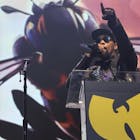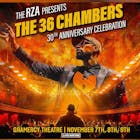
'Enter The Wu-Tang (36 Chambers)' At 30
'Enter The Wu-Tang (36 Chambers)' At 30
By Jay Quan
Published Thu, November 9, 2023 at 8:00 AM EST
Prince Rakeem
In 1991, a frustrated Prince Rakeem (later known as The RZA) had achieved the dream of securing a major label recording contract, but due to circumstances beyond his control he missed the opportunity to enjoy the fruits of his hard work. Rakeem was dropped from Tommy Boy Records after the disappointing engagement surrounding his single "Ooh I Love You Rakeem." The GZA, who recorded as The Genius, also released a project in 1991 titled “Words From The Genius” on Cold Chillin’ Records.
“I don’t think the time that The Genius came to Cold Chillin’ was the perfect time for him,” Juice Crew member and Cold Chillin’ artist Kool G Rap said in Goin’ Off by Ben Merlis. ”If he had been there closer to the mid 1980’s when me, Kane and Craig G got there he would have been more affiliated with the Juice Crew and he would have gotten a better shot. He was just on the label, so he didn’t get none of the momentum that the Juice Crew would get. He pretty much had to struggle on his own with a roster of affiliated artists.”
Easy Mo Bee, who produced Words From The Genius, told Merlis that he has demo tapes by The Genius that contain rhymes that found their way onto Enter The Wu-Tang. “Every time he came to the crib he would bring somebody different”, he recalled. “I remember a young Raekwon tagging along and he also brought this guy named Ason who called himself Ol’Dirty Bastard.
Ol’ Dirty Bastard, or ODB as he would come to be known, was also a cousin to Rakeem and the Genius. The trio once formed a group called Force of The Imperial Master (later known as All In Together Now) before Genius and Rakeem released their 1991 offerings.
After Rakeem and the Genius were free of their respective record deals, Rakeem vowed not to seek out another deal based on the structure of the deals that he and his cousin previously signed. Rakeem, who had changed his name to the RZA, gathered the best MCs in New York City’s Staten Island, and joined them with his cousins.
"If you keep eating McDonald's, you gonna get sick,” he told NPR regarding the formulation of the Clan. "You need a real home-cooked meal. And I knew that that would be healthier. And that's what Wu-Tang was: It was a home-cooked meal of Hip-Hop. Of the real people."
The RZA named his new collective the Wu-Tang Clan based off the bad guys in one of his favorite martial arts movies.
"I thought that Wu-Tang was the best sword style," he said. "The best sword-style of martial arts, and the tongue is like a sword. And so I say that we have the best lyrics so therefore, we are the Wu-Tang Clan."
Protect Ya' Neck
In December 1992, the Wu-Tang Clan independently released "Protect Ya Neck"/"After The Laughter" on their own Wu-Tang Records. The record cover introduced us to the now world renowned Wu-Tang Clan logo, as it was featured prominently with a sword and holy book.
The Clan reportedly sold the single from the trunks of their cars and pushed it to radio stations, finally receiving airplay and multiple requests for the song. "Protect Ya' Neck" was the perfect introduction to the Wu and contained a performance by every member with the exception of Masta Killa. The single contained three version of "Protect..." — the radio edit, the bloody version, and the instrumental. "After The Laughter" contained the vocal and instrumental versions.
The independent success of "Protect Ya' Neck" caught the attention of major record labels, and the Clan ultimately signed with Steve Rifkin's Loud/RCA imprint. On May 3, 1993, Loud Records reissued "Protect ya Neck" with the same artwork, but "After The Laughter" was replaced with "Method Man."
The Wu-Tang financed, Kurt Anthony-directed "Protect..." video, coupled with the catchy and dope "Method Man," were the perfect vehicles to create anticipation for a full Wu-Tang Clan project, and their debut Enter The Wu-Tang (36 Chambers), dropped later that year.
DROP YOUR EMAIL
TO STAY IN THE KNOW
Enter The Wu-Tang
On November 9, 1993, The Wu-Tang Clan released Enter The Wu-Tang (36 Chambers) and provided context to the original single. The sword, the W, and holy book now made sense. The album cover, which featured shadowy, masked figures conducting a sneak attack, was actually what we were witnessing with this opus.
The first selection, "Bring The Ruckus," with its Kung Fu flick intro and dirty piano samples scattered throughout the track, further cemented the fact that new sheriffs were indeed in town. Ghostface jumps off the track: "Ghostface, catch the blast of a hype verse, my glock bursts, leave in a hearse, I did worse I come rough, tough like an elephant tusk ya head rush, fly like Egyptian musk."
This was fight music.
At a time when we didn't consume our music a la carte, the sequencing of an album was still important, and the upbeat "Shame On A Nigga," with Ol' Dirty Bastard and his drunken style on the first verse was a great contrast to the darkness on "Bring The Ruckus."
As we continued to witness the dynamics and idiosyncrasies of each MC, fans were beginning to pick their favorites, and the Kung Fu references and snippets are clearly not random to those who are listening. It becomes obvious that Meth possesses a crazy cadence, Raekwon is a master of unorthodox delivery, and ODB's previously mentioned drunken style is the stitching that holds it all together on "Shame On A Nigga."
"C.R.E.A.M." is not only an incredible song, but it's one of Hip-Hop's flyest acronyms, while "Tearz" and "Can It All Be So Simple" were reminders of the fact that while the Clan featured prolific lyricists, they also came from environments where illegal activities and street life were very much a part of survival.
"Wu-Tang Clan Ain't Nuthing Ta F Wit" served as both a Clan anthem and a warning, while "The Mystery of Chessboxin'" showcased each MC as skilled wordsmiths. Enter The Wu-Tang felt more like an immersive experience than a traditional album. The classic "Killah Tape" and "Torture" skits became a part of popular culture.
The album was an incredible glimpse of what would soon become Hip-Hop's most revered and storied supergroups, and 30 years later, the Wu-Tang symbol is not only one of the most recognizable in Hip-Hop, but in all of modern music.






